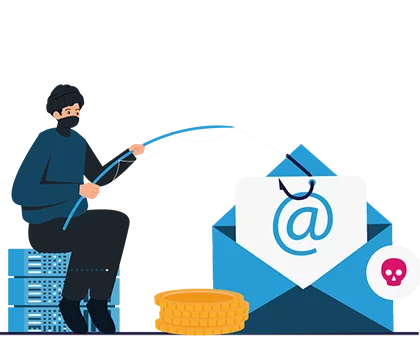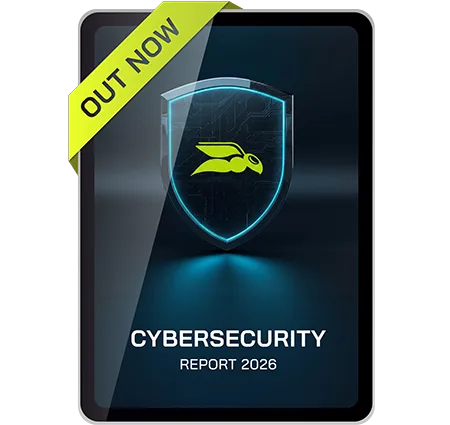

Stop Black Friday Scams Before They Hit Your Brand
The biggest shopping week of the year is almost upon us – Black Friday and Cyber Monday – are you ready for the inevitable scams?
Not just as a consumer, but is your organization ready for the danger to your brand ahead? In this article, we’ll look at the reputational damage that can result if you don’t have your digital house in order to combat Black Friday scams.
Scenario: A nightmare before Black Friday
Imagine that you’re responsible for the IT systems in GL/Monosonic/PH/Sungsam electronics corporation (pick your favorite), and you’ve been planning the special deals you’re going to offer for months.
Emily is a loyal customer who receives a slick-looking email from your business with a special offer, only available to dedicated fans, with great deals on three new products.
She clicks one of the links, an appealing and professional website shows up with the details, and with the special discount already applied, Emily picks her favorite color of a new gadget, enters her credit card details and orders it.
After a few days however, with no updates or shipping details, she reaches out to your organization, only to find that you never sent that email and that the whole thing was a Black Friday scam.
This is obviously a bad situation for Emily and everyone else who falls for Black Friday scams, but it also doesn’t look good for your brand, particularly if this happens to a lot of people.
Why didn’t Emily’s email system flag the scam email as fake or at least suspicious? That’s a good question, and it’s got to do with setting up the right Domain Name System (DNS) records for your business domain.
DMARC – the third pillar
The reality is that to run any successful and trustworthy digital business online today (even if you’re not an electronics giant selling gadgets) you need to have the protections available for email communications in place.

DMARC (Domain-based Message Authentication, Reporting & Conformance) works hand in hand with the other two email security protocols; Sender Policy Framework (SPF) and DKIM (DomainKeys Identified Mail).
SPF lets you define which servers are allowed to send email on behalf of your organization (based on your email domain, “company.com”), whereas DKIM uses digital signatures to ensure that email messages that are sent from your domain haven’t been tampered with in transit.
DMARC brings SPF and DKIM together by telling receiving email servers what they should do with emails that appear to be coming from your organization but that aren’t (like the one the criminals sent to Emily above) – quarantine or reject them.
If you have good governance over all systems in your organization that send email on behalf of your domain(s), including external email newsletter services etc., you should be able to set the DMARC policy to reject.

In our story above, this would have meant that the scam email would have been deleted by her email service and never showed up in her (or anyone else’s) inbox.
Building trust with your customers is different in brick-and-mortar stores compared to the internet. In a store you can make sure your staff presents a professional and trustworthy appearance, and handle customer complaints well, for example.
On the internet, your professional looking website could be cloned by criminals with very little effort, so building trust with your customers is more difficult. One of the best ways is to make sure that criminals can’t send emails that appear to be coming from your organization.
There’s a fair bit of work involved in making sure that your DNS records are correct, and for DMARC in particular there’s interpreting and correlating the automated report emails that other email servers can send to you – and Hornetsecurity offers an easy-to-use tool to make sure all your records are correct: DMARC Manager.
It’s got a domain configurator for the different required records and TLS (encrypted email) set up, plus a status dashboard that shows you passed or failed DMARC checks, detailed overview of the sources sending emails from your domains and more.
How Cybercriminals Use Domain Spoofing and Brand Impersonation
The challenge is that emails inherently have no built-in method to ensure that they’re legitimate, and thus a spoofed email sent from “Sumgsam” will look just as legitimate as the real thing, unless you take steps to prevent scammers taking advantage of this “in your name”.
That’s where DMARC comes in – as long as you have set it up correctly, when an email server receives the fake email, it’ll check the SPF, DKIM and DMARC records and because the email is not being sent from one of the services you’ve designated as valid, it’ll follow the instructions in the DMARC record to either reject or quarantine it.
Typical Black Friday fraud campaigns include fake promotions as we described above, but other “popular” types include gift card offers or fake order confirmations.
Remember too, that when jilted customers take to social media to vent their frustration over having been scammed, they won’t blame some nameless and faceless criminal, they’ll ask why your organization didn’t do enough to protect them – after all the scam worked because of the trust and brand recognition your business has built up.
Overall cybercriminal activity spikes 70% over Black Friday / Cyber Monday compared to regular shopping days and smaller businesses are hit particularly hard, with 56% reporting an attack during Black Friday sales in 2024.
Phishing scams are the most common threat, accounting for 42% of attacks, and 32% of phishing scams during Black Friday target digital wallets like PayPal and Apple Pay.
Fake e-commerce sites increased by 38% between 2023 and 2024 but the clincher is the fact that 62% of consumers would avoid a retailer if they experienced a security breach, impacting brand loyalty. These, and many more statistics painting this grim picture can be found here.
Protect Your Brand This Black Friday with DMARC Manager
Black Friday scams can destroy trust in seconds. With Hornetsecurity’s DMARC Manager, your company can:
- Block spoofed emails before they reach customers.
- Protect your brand from impersonation.
- Build customer confidence during the busiest shopping season of the year.

Stay one step ahead of Black Friday scams. Request more information on DMARC today.
Request a demo today and see how DMARC Manager safeguards your domains against email impersonation, phishing, and spoofing with intuitive management:
A Safer Black Friday for You and Your Customers
Black Friday scams are certainly a nuisance for consumers who fall for them, but they’re more than that for businesses whose reputation is impacted.
Implementing DMARC is an easy process with our DMARC Manager, and it’s well worth it, compared to people being fooled by scam emails from criminals and thinking they come from your organization.
FAQ
Email security is vital during Black Friday since phishing scams account for 42% of attacks. Implementing protocols like DMARC helps protect your brand from impersonation and builds customer trust during this busy shopping period.
Black Friday scams can damage a brand’s reputation, leading to consumer distrust. With 62% of shoppers likely to avoid retailers after a security breach, protecting your brand during this peak shopping season is critical.
Black Friday scams can significantly harm a brand’s reputation. With 62% of consumers avoiding retailers after a security breach, implementing DMARC to prevent phishing is essential for maintaining customer confidence during the holiday shopping season.

